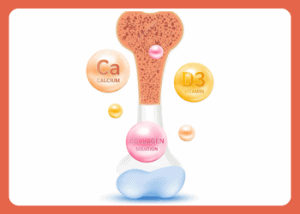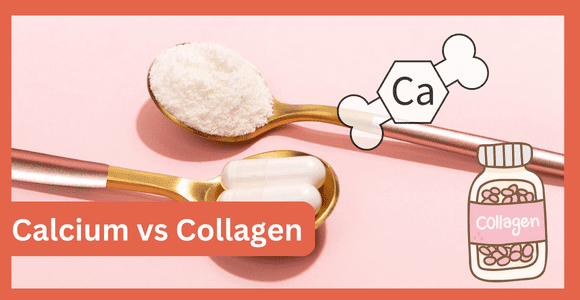For a daily dose of essential nutrients, individuals often turn to calcium supplements – whether it be in the form of chews, tablets, or gummies.
Unfortunately, not enough people are getting the calcium they need from their diets, and this could create issues with our bones. After all, these serve as the very foundation of our bodies—keeping us upright and strong! In order to maintain peak bone health, it is essential that we consume those foods rich in calcium.
Though many comprehend the significance of calcium for our bones, you may not be aware that collagen also plays an important role.
In fact, around a third of our bone material is composed of collagen; it works as a binding agent to hold them together and form strong foundations. Collagen supplement acts like glue in such cases.
Table of Contents
What are Calcium and Collagen?
Calcium is a crucial mineral for the body to carry out various functions, from constructing and reinforcing bones and teeth to regulating muscle motion and nerve transmission. Furthermore, this vital component plays an important role in blood clotting as well as maintaining your heart’s beat.
Collagen is a structural protein found in the human body that offers essential stability and backing to skin, ligaments, tendons, and cartilage. Making up approximately one-third of our total proteins within us, it’s no surprise why Collagen reigns as the most prevalent protein inside us.
Does Collagen Give You Calcium? While collagen may contain some calcium, the amount is relatively small and unlikely to provide a significant source of calcium for the body.
Therefore, collagen supplements are not typically recommended as a source of Ca. Calcium is best obtained through dietary sources or calcium supplements specifically designed to meet daily calcium requirements.
| Calcium Benefits: | Collagen Benefits: |
|---|---|
| Essential mineral for bodily functions | Protein found in the body that provides structure and support to various tissues |
| Builds and maintains strong bones and teeth | Improves hair, skin health, and elasticity |
| Helps muscles and nerves function properly | Helps relieve joint pain and stiffness |
| Plays a role in blood clotting and regulating heart rhythm | May reduce the risk of bone loss and is great for osteoporosis |
| May lower the risk of osteoporosis and colon cancer | Supports gut health |
| Side effects: constipation, upset stomach, kidney stones, interference with absorption of iron and other minerals | Side effects: allergic reactions (very rare), digestive discomfort (with excessive intake), interference with absorption of other proteins |
Difference Between Calcium and Collagen
Calcium is the driving force powering our bones and muscles, optimizing function for healthy bodies. On the other hand, collagen acts as a structural support system for tissues like skin, tendons, and cartilage – it’s no wonder why these two substances are so crucial to sustaining us!
While calcium supplement is the primary component of bones, collagen can be located in diverse tissues throughout one’s body.
Unfortunately, excessive consumption of either nutrient causes disruption – too much calcium leads to kidney stones and hinders absorption of other minerals; an overabundance of collagen results in digestive distress as well as interference with protein uptake.
Collagen Vitamin D and Calcium
Collagen, vitamin D, and calcium are all essential nutrients that play a pivotal role in our bodies. Collagen is an integral protein responsible for providing structural support to the skin, bones, tendons, and ligaments.
Vitamin D aids with the absorption of calcium which helps maintain bone health while enabling muscle functioning as well as nerve transmission. Consequently making these three vital components are indispensable for one’s overall well-being.
 Calcium is an essential mineral for human health, playing a key role in the formation of bones and teeth, aiding blood clotting processes, and maintaining normal cardiac rhythms.
Calcium is an essential mineral for human health, playing a key role in the formation of bones and teeth, aiding blood clotting processes, and maintaining normal cardiac rhythms.
The body can naturally obtain calcium from certain food sources; however, some individuals may be required to supplement this intake if their daily dietary requirements are not met.
Before taking any supplements it is vital that you consult with your healthcare provider to determine the correct dosage as well as avoid potential interactions between these supplements and existing medications or underlying medical conditions.
Collagen peptides are easily absorbable compared to collagen supplement that is created by breaking down larger molecules of collagen into smaller peptide components.
Adding these supplements to food or beverages has been known to offer many health advantages, like enhancing skin elasticity and joint strength while also increasing muscle mass.
Can I Take Vitamin D, Calcium, and Collagen Together?
Yes, you can take vitamin D, calcium, and collagen together. Vitamin D helps with the absorption of calcium, which is essential for bone health, while collagen provides support for various tissues in the body. Can You Take Collagen with Calcium? Yes.
However, it is important to follow the recommended dosage and consult with a healthcare professional if you have any concerns or underlying health conditions.
Collagen Dressing vs Calcium Alginate
Collagen dressing and calcium alginate are both types of wound dressings used to promote healing and prevent infection. While they share some similarities, there are also key differences between the two:
Collagen Dressing:
- Made from purified collagen, typically derived from animal sources
- Forms a gel-like substance when in contact with wound exudate
 Helps promote wound healing by stimulating new tissue growth
Helps promote wound healing by stimulating new tissue growth- Can help control bleeding in some cases
- Useful for chronic wounds, burns, and surgical wounds
- May require a secondary dressing to secure in place
Calcium Alginate:
- Made from seaweed or other algae sources
- Forms a gel-like substance when in contact with wound exudate
- Absorbs excess moisture from the wound bed
- Helps promote wound healing by providing a moist environment for cell growth
- Useful for moderate to heavily exudating wounds, such as pressure ulcers and venous leg ulcers
- Can be left in place for several days before changing
Overall, the choice between collagen dressing and calcium alginate will depend on the specific characteristics of the wound and the individual patient’s needs. A healthcare professional should be consulted to determine the most appropriate treatment plan.
Frequently Asked Questions
Does Collagen Increase Calcium?
Unfortunately, there is no scientific proof that suggests collagen augments calcium levels in the body. Even though collagen does contain some traces of calcium, it is so minimal that it unlikely has a serious effect on total calcium concentrations.
On the other hand, kidneys and hormones like parathyroid hormone and calcitonin are responsible for maintaining appropriate blood concentration of calcium levels.
Does Collagen Have Calcium?
Indeed, collagen is a source of calcium, albeit in limited amounts. The quantity of calcium may also vary depending on the origin and processing techniques used for production.
Who Should Not Take Collagen?
Collagen supplements may not be safe for People with fish, shellfish, or egg allergies (collagen supplements may contain these allergens as ingredients). People with a Kosher or Halal diet. People with a vegetarian or vegan diet.
Are Collagen and Calcium the Same Thing?
Absolutely not! Collagen and calcium are two entirely different things. While collagen is a protein, that provides vital structural support to particular tissues, calcium is an essential mineral that aids with bone health, nerve transmission, and muscle function.
Sure – some collagen might contain small amounts of calcium but they have separate roles in the body; there’s no mistaking it.
How Much Calcium is in Collagen?
Accompanying the same amount of collagen peptide are 29 milligrams of calcium, 44.9 milligrams of sodium, and 0.98 milligrams of potassium – a powerhouse blend that helps to nourish your body in multiple ways.
Is Collagen or Calcium Better for Bones?
Calcium is better for bones than collagen. While collagen is an important component of bone tissue, calcium is the mineral that provides the strength and density necessary for healthy bones. Adequate calcium intake is essential for bone health, while collagen supplements may provide some benefits but should not be relied on as a sole source of bone support.
What Happens to Your Body When You Start Taking Collagen?
When you start taking collagen supplements, several beneficial changes can occur in your body. Collagen is a protein that plays a crucial role in maintaining the structure and integrity of various tissues, including skin, hair, nails, joints, and bones. Here’s a detailed overview of what happens when you incorporate collagen into your daily routine:
Skin Health and Appearance
Increased Elasticity and Hydration: Collagen supplements can enhance skin elasticity and hydration. As you age, your body’s natural collagen production decreases, leading to wrinkles and dryness. Supplementing with collagen peptides can help replenish these levels, resulting in smoother, more hydrated skin.
Reduction of Wrinkles: Regular intake of collagen has been shown to reduce the appearance of fine lines and wrinkles. Clinical studies have demonstrated that collagen peptides improve skin elasticity and moisture, leading to a more youthful appearance.
Joint Health and Pain Relief
Improved Joint Function: Collagen is a major component of cartilage, the tissue that cushions joints. Taking collagen supplements can help maintain cartilage health and improve joint function. This is particularly beneficial for individuals with osteoarthritis or those who experience joint pain from physical activity.
Reduced Joint Pain: Studies have shown that collagen supplements can reduce joint pain and inflammation. This is especially helpful for athletes and older adults who are prone to joint discomfort.
Hair and Nail Strength
Stronger Hair: Collagen contains amino acids that are essential for hair growth. Supplementing with collagen can promote hair thickness, strength, and overall health. Many users report less hair shedding and improved hair texture after consistent collagen use.
Healthier Nails: Collagen can also strengthen nails, reducing brittleness and promoting faster growth. If you have weak or slow-growing nails, collagen supplements can make a noticeable difference.
Bone Health
Increased Bone Density: Collagen contributes to bone strength and structure. Taking collagen supplements can help increase bone mineral density, which is crucial for preventing osteoporosis and fractures, especially in postmenopausal women.
Muscle Mass and Strength
Muscle Maintenance: Collagen supplements can support muscle mass and strength. Collagen contains glycine, an amino acid that helps in the synthesis of creatine, which in turn supports muscle performance and recovery.
Digestive Health
Improved Gut Health: Collagen supports the lining of the digestive tract, which can improve gut health. It helps maintain the integrity of the gut barrier, potentially reducing symptoms of leaky gut syndrome and promoting better nutrient absorption.
Overall Well-being
Enhanced Recovery: Collagen can aid in recovery from exercise and injuries by supporting the repair of tissues. This is beneficial for athletes and active individuals who require faster healing and reduced downtime.
Antioxidant Support: Some forms of collagen, particularly those derived from marine sources, contain antioxidants that can help reduce oxidative stress and inflammation in the body.
Conclusion
All in all, collagen and calcium are two distinct nutrients that have different purposes in the human body. Collagen serves as a structural support for various tissues, while calcium is required for bone health, muscle function, and nerve transmission. Even though certain types of collagen may include some calcium content, it’s not enough to be an essential source of this mineral.
Collagen peptides are becoming increasingly popular for their possible health benefits, however, further research is necessary to gain a complete understanding of the effects.
It’s essential that you seek advice from your healthcare provider before taking any dietary supplement in order to determine the appropriate dosage and avoid potential interactions with medications or existing medical conditions.

 Helps promote wound healing by stimulating new tissue growth
Helps promote wound healing by stimulating new tissue growth